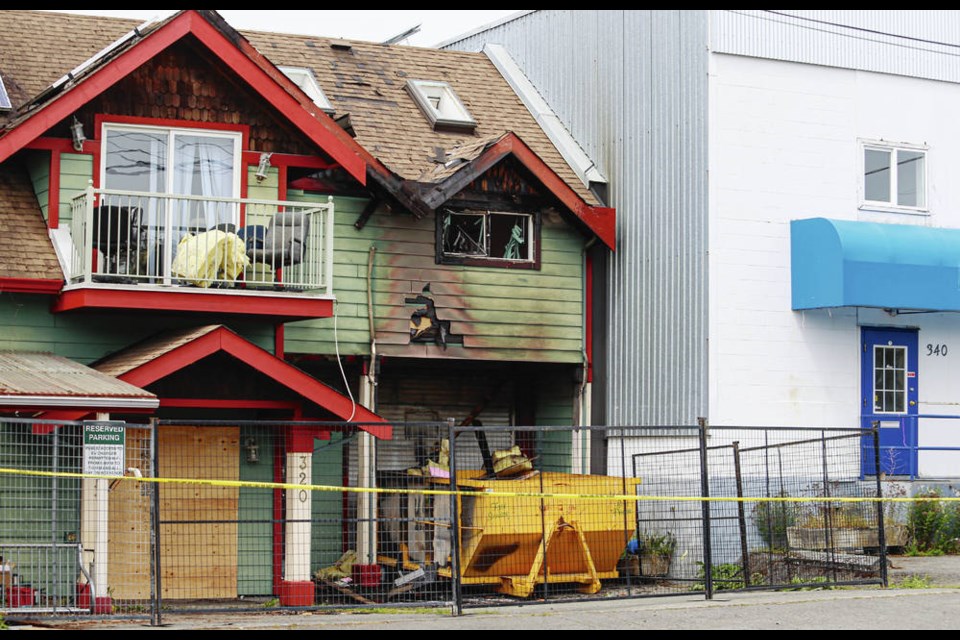The arrest for arson of a tenant of a Vic West shelter has likely eroded the “uneasy” trust many area residents had in the Russell Street facility, says the president of the neighbourhood association.
Victoria police said they arrested a man in relation to a fire that caused about $400,000 in damage to a business a block from the temporary shelter. Police said the man was arrested at the shelter, which is managed by Our Place Society and opened two weeks ago to house people sheltering in city parks. He has since been released with a court date.
Many residents in the area were concerned when they first learned about the shelter coming to Vic West, but they became more comfortable with the idea after learning about the plans, and that Our Place would run the site, said Justine Semmens, president of the Victoria West Community Association.
Semmens said most residents want to be welcoming, but they’re concerned about who is selected to move into the facility and want to know what criteria B.C. Housing uses when offering spaces. Many feel “deep frustration” with what they see as a lack of communication from B.C. Housing, she said.
“How can we be sure that nobody’s coming in who’s a criminal, who’s dangerous?” Semmens said.
B.C. Housing said in a statement that placement in the Russell Street shelter is based on an assessment that looks at an individual’s physical and mental health, addictions, history of homelessness and preferences.
The provincial agency thanked neighbours for their patience while residents settle into their new home, and said it’s in the process of setting up a community advisory committee to oversee the shelter’s integration in the community.
“It is our experience that after a few months, residents stabilize and public disturbances decrease dramatically. We know from evidence in B.C. and internationally that communities are safer and healthier when people have housing and the supports they need,” B.C. Housing said.
The long-term plan for the Russell Street location is to create 40 units of permanent supportive housing.
A solar power sales company had mostly moved out of the building at 320 Mary St. that suffered fire damage, and the new tenant was lined up to move in, said real estate agent Philip Illingworth. No one was in the space at the time of the fire.
“I’m confident that the insurance company will step up, and that we’ll move on,” Illingworth said.
Illingworth, whose wife volunteers at Our Place, said he believes most of the people supported by the charity aren’t a problem, and he’s not worried about future incidents.
“But it’s like anything. You have a few bad apples who ruin it for everyone,” he said.
The man who was arrested for arson lost his shelter space, in an incident that underscores the need for complex-care housing, said Grant McKenzie, communications director for Our Place.
The non-profit is “extremely disappointed” by the incident, he said. Our Place does not make the decision to remove someone from housing lightly, but has a zero-tolerance policy for crime, McKenzie said, adding safety for residents and neighbours is a top priority.
“[Saturday] night, there were 29 other people in that shelter who had a good night’s sleep because housing was available for them. We can’t jeopardize that,” McKenzie said.
Outreach workers, who can provide help filling out applications for housing, detox, identification, returning to school or finding work, do not have the training to help people with complex mental-health needs, McKenzie said.
The needs of someone who sets fire to property are “such a step above a local charity providing housing,” he said.
“It shows that there’s such a gap that we’re missing, you know. So this person has been arrested for arson, and the way the system seems to be working, he’ll probably be released this afternoon or tomorrow. And he’ll be released back onto the street, because there is no place to put him,” McKenzie said Sunday. “There is no place of complex care that can look into what’s causing this.”
The mayors of B.C.’s 13 largest municipalities, including Victoria Mayor Lisa Helps, have urged the province to create complex-care housing where people with severe mental-health challenges can receive intensive help.
The Russell Street shelter features 60 individual pods with a single bed and bedside table, with three and a half short walls around the unit, but capacity is currently capped at 30.
Our Place staff have already seen the effects moving indoors can have on new residents in the shelter. One woman made the move to detox just a week after settling into her own pod from a tent in a nearby park, said Cathy Mingo, manager of housing and shelter for Our Place. She had tried to enter the program several times before, but hadn’t stayed for more than a night, Mingo said.
“She didn’t feel safe, comfortable, supported enough to go. So just being at Russell Street for that one week, she felt confident enough to try and detox herself,” she said.
Mingo said she has watched residents of other supportive-housing sites managed by Our Place move on to their own housing, reconnect with family, go back to school to earn a high school diploma and start jobs for the first time in years.



